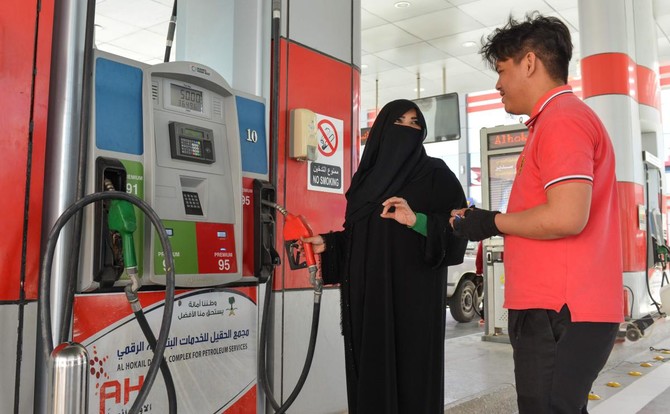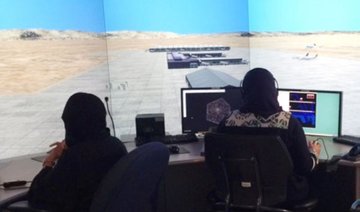KHOBAR, Saudi Arabia: Mervat Bukhari, a force of nature draped head-to-toe in Islamic niqab, braved insults and taunts to become the first Saudi woman to work at a gas station, something unimaginable not long ago.
The kingdom is in the midst of reforms that mark the biggest cultural shake-up in its modern history.
Kickstarted by Crown Prince Mohammed bin Salman, the reforms include the historic decision allowing women to drive from June, attend soccer games and take on jobs that once fell outside the narrow confines of traditional gender roles.
But the backlash faced by women like Bukhari illustrates how newfound empowerment is a potential social lightning rod in a country unaccustomed to such visibility for women.
When Bukhari, 43 and a mother of four, was promoted as supervisor of a gas station in eastern Khobar city last October, insults began pouring in on social media with the hashtag “Saudi women don’t work at gas stations.”
Bukhari, previously employed in a junior role by the same parent company, was forced to go on the defensive, telling critics she was in a managerial position and not physically handling fuel nozzles.
“I am a supervisor. I don’t fill gas myself,” she reasoned, seeking to win a modicum of respectability for a job that class-conscious Saudi men disdain.
“Women today have the right to do any work.”
Prince Mohammed’s Vision 2030 reform plan for a post-oil era seeks to elevate women to nearly one-third of the workforce, up from about 22 percent now.
Government statistics also put more than one million Saudi women as currently looking to enter the workforce.
The reforms have seen the Saudi labor market slowly open up to women, introducing them to jobs that were once firmly the preserve of men.
The social change, catalyzed in large measure by what experts characterise as economic pain owing to a protracted oil slump, has introduced a series of firsts.
Saudi media has championed in recent months the first woman restaurant chef, first woman veterinarian and even the first woman tour guide.
But women face sobering realities — despite often being better qualified than men.
“Saudi women are better educated, but less mobile, less employed and vastly underpaid,” Karen Young, a scholar at the Arab Gulf States Institute in Washington, told AFP.
Average monthly salaries in the private sector are close to 8,000 Saudi riyals ($2,134, 1,748 euros) for men, and only 5,000 riyals for women, according to research firm Jadwa.
But Riyadh is seeking to change that through what appears to be social engineering.
The decision to allow women to drive after a decades-long ban could give women the much-needed mobility to join the workforce.
For the first time, women are seen alongside men in jazz music concerts and in mixed-gender restaurants.
“The well-known expression: ‘You are a woman, cover your face’ seems to be disappearing from our society,” human rights lawyer Abdulrahman Al-Lahim wrote recently in Okaz newspaper.
But Saudi activists say social change will only be cosmetic without dismantling the rigid guardianship system, which requires that women seek permission from a male relative to study, travel and other activities.
That leaves many vulnerable to the whims of a controlling father, a violent husband or a vengeful son.
Horror stories have regularly surfaced.
Women inmates are often reported to be stuck in prisons after completing their terms because they were not claimed by their guardians.
One Saudi woman told AFP how she was stuck in limbo, unable to even renew her passport, when her father, her only male guardian, slipped into a coma after an accident.
“If I could choose between the right to drive or the right to end guardianship, I would choose the latter,” a women’s activist said on the condition of anonymity.
Saudi women now no longer need male permission to start business.
Saudi Arabia also recently annulled the “house of obedience” article in the marriage law, which grants a husband the right to summon his wife to his home against her will.
The reform introduces a novel concept in married life: mutual consent.
“This is not a revolution, this is evolution,” Hoda Al-Helaissi, a member of the advisory Shoura Council, told AFP, referring to newfound social liberties.
“It’s a rite of passage for women.”
Back at Bukhari’s home in neighboring Dammam city, she embraced her youngest son Mohammed — who stood by her even as her brothers decried her gas station job as a shocking breach of tradition.
But the 16-year-old prefers to hide his mother’s job from his peers, hoping to protect her from even more insults.
“Maybe five years from now it will be normal to see women at gas stations,” he said, kissing his mother’s hand.
Saudi women will drive but face bumpy road to empowerment
Saudi women will drive but face bumpy road to empowerment

Saudi FM meets with Slovenian counterpart

- During the meeting, the ministers discussed ways to enhance cooperation relations between their countries in various fields
RIYADH: Saudi Foreign Minister Prince Faisal bin Farhan received his Slovenian counterpart Tanja Fajon in Riyadh on Wednesday.
During the meeting, the ministers discussed ways to enhance cooperation relations between their countries in various fields and intensify bilateral coordination on issues of common interest.
They also discussed international developments and efforts made in this regard.
Health Ministry urges pre-Hajj vaccinations via Sehhaty

- The required vaccinations include a dose of the COVID-19 vaccine and one of the influenza vaccine taken this year
- The ministry said that vaccinations for domestic pilgrims are available at primary health care centers
RIYADH: The Ministry of Health urged individuals in Saudi Arabia who plan to go on Hajj this year to receive their vaccination shots beforehand and to register them via the Sehhaty app, the Saudi Press Agency reported.
The required vaccinations include a dose of the COVID-19 vaccine and one of the influenza vaccine taken this year, along with a dose of the meningitis vaccine taken within the past five years. These vaccines are crucial for the well-being of pilgrims during Hajj.
The ministry said that vaccinations for domestic pilgrims are available at primary health care centers. Those intending to perform Hajj this year should schedule an appointment through the Sehhaty app.
Completing vaccinations before Hajj is essential due to the gathering of large crowds from around the world performing rituals in one place, which may expose them to infection with numerous contagious diseases prevalent in certain countries, the ministry said.
Following health guidelines before arriving at the holy sites protects both pilgrims and service workers, helping to safeguard against diseases that could disrupt Hajj rituals. Doing so also ensures the safety of individuals arriving from abroad to the Kingdom.
Pilgrims from outside the Kingdom must obtain specific vaccinations before Hajj, including for meningococcal disease, yellow fever and polio.
The ministry stressed the necessity of only using approved vaccines in the Kingdom, including those against COVID-19 and seasonal influenza, as well as updating vaccinations against diphtheria, tetanus, pertussis, polio, measles, mumps, rubella, and chickenpox.
Arab forum targets illicit financial networks

- The discussion is at the heart of Saudi Arabia’s endeavors to uphold the rule of law and promote fair competition between companies
RIYADH: The Arab Forum of Anti-Corruption Agencies and Financial Intelligence Units began on Wednesday in Riyadh, hosted by Saudi Arabia’s Presidency of State Security, and discussed targeting illicit financial networks.
Focusing on institutional frameworks and joint coordination between multiple parties, the discussion included global speakers: Jawhar Nfissi, president, National Financial Intelligence Authority in Morocco; Daniel Glaser, global head of jurisdictional services at K2 Integrity and head of its Washington, D.C. office; Elzbieta Frankow-Jaskiewicz, interim chair, Egmont Group of Financial Intelligence Units; Suliman Aljabrin, executive secretary, Middle East and North Africa Financial Action Task Force, Bahrain; Khadija Ali, head of the Financial Investigation Unit, Republic of Comoros; Mohamed Allal Al-Kahil, head of the Financial Prohibition Unit, Islamic Republic of Mauritania.
The discussion, addressing anti-money laundering and countering the financing of terrorism, is at the heart of Saudi Arabia’s endeavors to uphold the rule of law, promote fair competition between companies, and achieve security and prosperity for all.
The session provided discussions on reform paths for various local entities taking action to harmonize their legal frameworks with the requirements set by the Kingdom’s Anti-Money Laundering Permanent Committee to advance its broader national reform agenda.
Elzbieta Frankow-Jaskiewicz, interim chair, Egmont Group of Financial Intelligence Units, talked about the firm’s efforts in fighting illicit financial networks.
“Many agencies use our technologies from private sectors and we work with our counterparts in Interpol, WCO, World Bank and G20,” Frankow-Jaskiewicz said during the panel discussion.
Egmont Group is important to the global CFT (Combating the Financing of Terrorism) regime in many aspects, such as in international information-sharing and in their secured channels for exchanging information.
“Using typologies that we developed over the course of these three years, we raise the operational effectiveness values; we enhance our FIU (Financial Intelligence Unit) capabilities in Egmont center and memberships,” she said.
Since its founding, Egmont has assisted more than 190 jurisdictions by constructing a new learning platform and providing technical support for FIU. With nearly 7,000 registered users and 2011 courses already developed and launched, Khadija Ali, head, Financial Investigation Unit, Republic of Comoros, talked about the regulation measures the country has in place when receiving a report.
“We have to ask for information in order to obtain the suspicious transaction file as soon as the financial institutions submit it to us. Additionally, if required, it is a report to the prosecution. In order to effectively combat this, we also work and interact with individuals who are affected by it, including banks, attorneys, notaries, jewelers, anti-corruption advocates and other subject persons,” she said.
“Not only must the government enact a new anti-corruption law, but it must also hire modern experts, the law against money laundering. This reveals the Comorian government’s dedication to fighting financial crime, and I would like to use this chance to praise this successful dedication. We have a system in place to fight money laundering and the funding of terrorism, which is implemented at the national level by a number of players, in line with the Comoros strategy,” she said.
Suliman Aljabrin, executive secretary of the MENA financial action taskforce in Bahrain, said during the session that the banking industry was developing well.
“The banking industry in the Arab world is quite developed, though not in terms of the private sector or the organization that oversees, monitors and supervises it. This indicates that there is a compromise to be struck between the need to prevent money laundering and the funding of terrorists and maintaining financial confidentiality, which is the standard. It will serve as the first entry-point for the official system to be introduced and the money to be laundered,” he said.
The challenge, according to K2 Integrity’s Daniel Glaser, has been how to take rules and regulations and make them effective for everyone, from the smallest countries to the US.
“Not that they don’t have the framework, but how do you get the framework to be implemented? And that requires so many different things. It requires political will. It requires investment of resources, sometimes more than countries are willing to invest,” he said.
The head of Morocco’s national financial intelligence body, Jawhar Nfissi, said that creating a national institutional structure and making a firm political commitment were essential. Also, monitoring the reports was vital, as according to statistics, there has been a 200 percent increase in suspicion indicators in Morocco during the past five years.
In light of international treaties, Mohamed Allal Al-Kahil, head of the Financial Prohibition Unit, Islamic Republic of Mauritania, emphasized the need for legislation to combat bribery and corruption, noting that current legislation falls short of the Financial Action Task Force’s recommendations.
Saudi Arabia issues royal decrees

- Sami bin Abdullah Muqeem was appointed vice president of the Saudi Authority for Data and Artificial Intelligence
- Al-Rabdi bin Fahd bin Abdulaziz Al-Rabdi was appointed as head of the National Data Management Office
RIYADH: Saudi Arabia issued various royal decrees on Wednesday. They are as follows:
Prince Abdulaziz bin Mohammed bin Abdulaziz bin Ayyaf Al-Muqrin was appointed special adviser to King Salman at the rank of minister. He is also responsible for carrying out the work of deputy minister of the National Guard.
Abdul Mohsen bin Abdulaziz Al-Tuwaijri was relieved of his position as deputy minister of the National Guard and appointed as an adviser to the Royal Court at the rank of minister.
Khalid bin Mohammed bin Abdulaziz Al-Abdulkarim was appointed secretary-general of the Council of Ministers at the rank of minister.
Mazen bin Turki bin Abdullah Al-Sudairi was appointed as an adviser to the General Secretariat of the Council of Ministers.
Sami bin Abdullah Muqeem was appointed vice president of the Saudi Authority for Data and Artificial Intelligence.
Al-Rabdi bin Fahd bin Abdulaziz Al-Rabdi was appointed as head of the National Data Management Office.
Abdulmohsen bin Saad bin Abdulmohsen Al-Khalaf was appointed deputy minister of finance.
Abdulaziz bin Saud bin Abdulaziz Al-Dahim was appointed assistant minister of commerce.
Abdullah bin Ali bin Mohammed Al-Ahmari was appointed assistant minister for planning and development at the Ministry of Industry and Mineral Resources.
Anas bin Abdullah bin Hamad Al-Sulai was appointed assistant minister of tourism.
Shihana Alazzaz was relieved of her position as deputy secretary-general of the Council of Ministers. By order of Crown Prince Mohammed bin Salman, Alazzaz was appointed as adviser to the Royal Court and chair of the board of directors at the Saudi Authority for Intellectual Property.
Saudi Arabia, UK launch art and heritage campaign

- ‘Two Kingdoms’ initiative unveiled by Saudi royal arts institute
RIYADH: Saudi Arabia’s Royal Institute of Traditional Arts, or Wrth, has launched an initiative with the UK titled “A Shared Heritage of Two Kingdoms,” which celebrates how art bridges cultures.
It is a part of the GREAT Futures Initiative Conference held in Riyadh on May 14 and 15, which showcased opportunities for UK businesses in Saudi Arabia.
The event began with several workshops and other activities in the King Abdullah Financial District, where artists from both nations focused on traditional practices and crafts including Najdi wooden doors and sadu weaving.
The campaign will move to London with a similar workshop planned for May 16 at the Victoria and Albert Museum. The session will focus on the “art of creating traditional Saudi doors” to foster cross-cultural understanding and greater artistic exchange, the organizers stated.

The campaign concludes at the Wrth headquarters in Riyadh on May 18, where British artist Harriet Frances will hold a workshop on jewelry embroidery so that local artists can learn about different cultural traditions.
UK Secretary of State for Culture, Media and Sport Lucy Frazer told Arab News: “I think it is really valuable for the sector as a whole because the Royal College of Art is one of our finest institutions, it’s produced artists like Tracey Emin, Ridley Scott, and it’s got a huge amount of knowledge.
"We want to share that knowledge and also learn from the Saudis as well in these important areas of arts, architecture, and design.”
The “Two Kingdoms” campaign runs in conjunction with World Cultural Diversity Day on May 21, which reinforces the Wrth’s mission to preserve traditional arts worldwide while empowering the artists who practice them.
For over 30 years, the Wrth has played a leading role in promoting Saudi Arabia’s unique cultural heritage through traditional arts education, exhibitions, and global exchange programs.
The royal institute contributes to the dissemination and global recognition of traditional arts, drawing attention to values shared by all humans, regardless of language, culture and customs.
In line with Saudi Vision 2030, the Wrth seeks to represent the culture of Saudi Arabia by showcasing the history of traditional artworks.





















